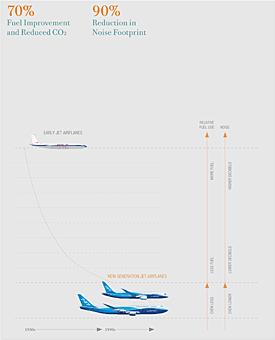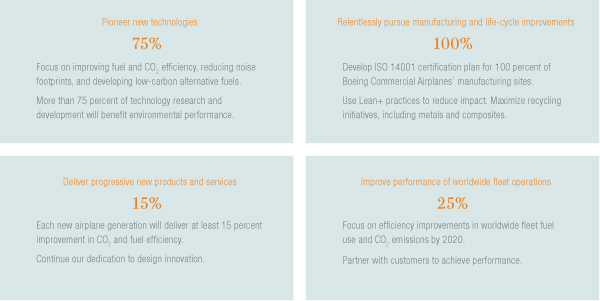

We all recognize that air transportation plays a vital role
in continued global economic growth. Eight percent of the world’s growth in gross domestic product can be directly attributed to air travel, making it essential to the global economy.
Scott Carson
Executive Vice President,
The Boeing Company
President and Chief Executive Officer, Boeing Commercial Airplanes
Our most immediate challenge is to continue to allow the global economy to prosper and to grow our industry responsibly, while minimizing impacts on the global ecosystem. Like our industry’s approach to safety, this is an issue that beckons for global solutions, not regional ones. The challenge is to develop a framework that everyone can join — a framework that moves the industry forward.
We know we can do it. We have a strong environmental track record as an industry. During the past 40 years, we’ve reduced noise by 75 percent. We’ve reduced carbon dioxide (CO2) intensity by 70 percent. We’ve virtually eliminated hydrocarbon emissions and soot.
Still, aviation’s carbon footprint today is 2 percent of global CO2 emissions, according to the United Nations Intergovernmental Panel on Climate Change, and we must be part of a solution that addresses the environmental impact of our industry.
At Boeing Commercial Airplanes, we firmly believe that market demand and competition will continue to drive new product innovation and improved fuel efficiency, and that solutions based on technology and operational efficiency are the best path forward. To that end, we have adopted four guiding principles as we work both within Boeing and around the world with our colleagues, customers, and partners.
Aviation Progress
Our Plan and Commitments
- First, we believe technology unlocks the future. Much of our airplane development work — be it weight reduction or advanced aerodynamics — is focused on fuel efficiency. More than 75 percent of Boeing Commercial Airplanes’ research and development effectively contributes to improving the environmental performance of our products. We also have developed alternative materials and processes for manufacturing and maintenance.
- Second, CO2 and fuel are the focus of our efforts. We are committed to improving the fuel efficiency and CO2 emissions for each new generation of airliners by at least 15 percent. Our newest airplanes, the 787 Dreamliner and the 747-8, exemplify our dedication to environmental design. Incorporating four innovative technologies — new engines, increased use of lightweight composite materials, high-efficiency systems applications, and modern aerodynamics — the 787 is designed to provide a 20 percent improvement in fuel use and an equivalent reduction in CO2 emissions compared to today’s similarly sized airplanes. The 747-8 offers a 16 percent improvement in fuel use and CO2 emissions over the 747-400. We also continue to explore far-reaching projects, such as low-carbon alternative fuels for aviation use.
- Third, we believe aviation system efficiency is essential. Even the most fuel-efficient airplane can’t achieve its highest efficiency levels if it is forced to fly indirect routes and to circle overhead waiting to land. Therefore, it is crucial that we do everything in our power to make improvements to the global air transportation system a priority and a reality. One example is Boeing’s “Tailored Arrival” concept, which increases airplane arrival efficiency by establishing a predictable continuous descent rather than the current step-down descent. Trials have demonstrated that implementing these types of advanced arrival techniques can save up to 500 gallons of fuel per flight.
- Fourth, a global approach involves and benefits everyone. As I mentioned earlier, the environmental challenge is a global issue that demands global solutions, not regional ones. This means that continuous performance improvement and technological innovation must be accompanied by strong working partnerships among industry, academia, and governments. Together with our airline customers and other industry leaders, we are firmly committed to a pathway toward carbon-neutral growth and the aspiration of a carbon-free future.
Today, we have the very real opportunity to demonstrate our technical prowess as an industry and help define the legacy of flying for generations to come. Working together, we can identify solutions and approaches that will help our industry address environmental challenges regardless of geographical markets — and in the process build a healthier, more environmentally progressive aviation industry that delivers value to everyone who depends on the global air transportation system.
Scott Carson
Executive Vice President,
The Boeing Company
President and Chief Executive Officer,
Boeing Commercial Airplanes



